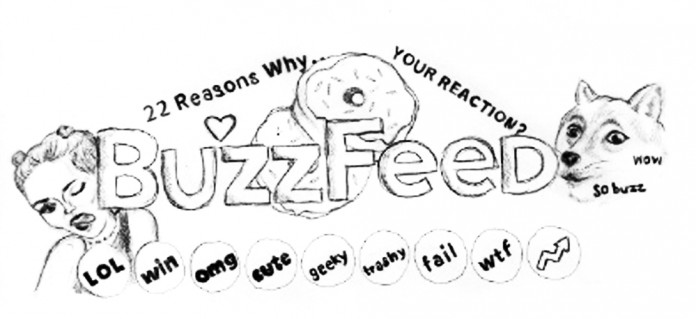Sam Goldman
Staff Writer
Illustration by Alexandra Dwight
Among its links to advertisements and other sites’ articles, Yahoo News has a photo “story” on South African elephants getting drunk on native fruit. The Huffington Post has been introducing BuzzFeed-esque articles such as “10 Couples Who Need Their Facebook Privileges Revoked.” CNN’s Headline News Channel brought in a psychic to discuss the disappearance of Malaysia Airlines Flight 370 (but whether or not she could confirm anchor Don Lemon’s suspicion of it being a result of a black hole, I’m not sure). All of these news sources have been heading down the “infotainment” road as they try to lure in more readers and viewers in a way that is appealing to the modern media consumer.
There is so much stuff on the Internet that people naturally look for the content that will most easily convey the material they wish to see. This is where sites like BuzzFeed and The Huffington Post succeed—readers can update themselves on much of what is going on in the world while simultaneously being entertained. The combination of short, simple news bits peppered with things like GIFs, top-10 lists, and quizzes–slated alongside pictures of bunnies that look like Miley Cyrus and nostalgic images archetypical of the ‘90s–provides us with this. In this model, we get our news quickly, simply (in more ways than one), and with a convenient dash of humor and “aww”s.
Infotainment lacks many of traditional news’ long, sophisticated words and plentiful paragraphs that often lack any visual component. We don’t have to think to get these entertaining bits of news. One obvious problem with this is that these sources don’t provide us with the in-depth critical reporting and analysis needed to be more than superficially informed about what’s going on. The briefest of summaries and a handful of random Twitter reactions don’t capture of the complexity of a story or bring home its significance.
On top of that, significant, serious news stories–because they can be relatively boring or hard to relate to–end up, ironically, being sensationalized and overanalyzed to the point that we often end up with Don Lemon’s absurd Malaysian-airlines-psychic-black-hole-let’s-ask-a-Twitter-fan segment that only strives to grab and hold our attention rather than provide us with anything meaningful. Although there are so many important events and developments in the world that deserve our attention, the 24-hour news cycle often opts for melodramatic coverage of a handful of exploitable stories so it can keep viewers coming. It’s tabloid journalism made into TV.
Unfortunately, many people are disinterested in what’s going on in the world or don’t find being adequately informed worthwhile. The BuzzFeedification of the news helps to bridge this gap and, for the people who normally aren’t interested, provides at least a half-decent injection of news. Additionally, it gives people somewhat of an escape from the more sad or disillusioning stories while still being able to remain somewhat informed. And even though I do often enjoy discovering how Pope Francis differs from his predecessors through the use of one-liners and side-by-side photo comparisons with Kevin Durant, it’s lamentable that we often need these kinds of content in order to inform ourselves. Ideally, we should all be concerned and interested enough in what’s going on around us to not need simple amusement peppered with only bits of news as our primary sources; professional news sites shouldn’t need to spice up their articles with links to semi-relevant BuzzFeed quizzes in order to stay competitive and keep readers within their folds.
If it helps people stay informed, some entertaining or luring additions to the news is fine, but they should be accurate and constructively contribute to or enhance what’s being reported. Rather than turn to sensational conspiracy theories or subtitled GIFs of people saying what could easily be printed out and analyzed, the infotainment aspect of the news should contain things like relevant photos and insightful diagrams that accompany an informative and in-depth story and won’t mislead or distract from what’s being reported. Infotainment formats can work with relevant, secondary extras and asides, but they should contain enough edifying content for the reader or viewer to come out informed. Properly done infotainment could very well entice more people to become better informed and would leave out the non-stop sensationalist coverage that unfortunately accompanies tragedies. There’s nothing wrong with perusing and enjoying what sites like BuzzFeed have to offer, but we should also make sure that we don’t let that kind of content take the place of truly informative news.











